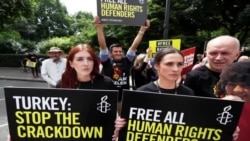On September 26, Turkish President Recep Tayyip Erdogan sat for an interview on CBS’s “Face the Nation” program. Among other things, Erdogan discussed his relationship with the administration of U.S. President Joe Biden, Turkey’s influence in the Middle East and the state of freedoms in his country.
Interviewer Margaret Brennan asked Erdogan about human rights in Turkey and whether he discussed the topic with Biden when they met in New York at last week’s United Nations General Assembly.
Erdogan said the leaders did not discuss human rights in Turkey, explaining:
“We don't have any problems of that nature in terms of freedoms, Turkey is incomparably free.”
But that is false. In fact, Turkey’s human rights record has been worsening for years on multiple fronts.
The watchdog group Freedom House said in its most recent report on global freedom that Turkey’s ratings declined steeply during the past 10 years, a deterioration second only that of Mali. After a failed 2016 coup, Erdogan used emergency laws to purge and punish suspected opponents.
Freedom House classifies Turkey as “not free,” with a rating on only 32 points on its 100-point measure of political and civil liberties. Summarizing the country’s record, the report said:
“As the COVID-19 crisis threatened the economy and the government’s political standing during the year, authorities apparently sought to manipulate official health statistics and launched criminal investigations against medical professionals who released independent information about the outbreak or criticized the official response. …”
“Prosecutions and campaigns of harassment against opposition politicians, prominent members of civil society, independent journalists, and critics of Turkey’s increasingly aggressive foreign policy continued throughout the year.”
The U.S. State Department said in its 2020 Country Reports on Human Rights Practices, released this past March, that thousands of people in Turkey, including politicians, journalists and minors, had been investigated by the government for allegedly insulting Erdogan, Turkish Republic founder Mustafa Kemal Ataturk or state institutions.
According to the State Department, human rights abuses in Turkey included “arbitrary killings, suspicious deaths of persons in custody; forced disappearances; torture; arbitrary arrest and continued detention of tens of thousands of persons, including opposition politicians and former members of parliament, lawyers, journalists, human rights activists, and employees of the U.S. Mission.”
The report noted that human rights abuses increased in Turkey after the 2016 coup attempt.
This month, the Council of Europe, which promotes human rights, democracy and the rule of law in Europe, said it would start proceedings against Turkey for jailing philanthropist Osman Kavala for four years without a trial.
The Turkish government accuses Kavala of engaging in anti-government protests in 2013 and involvement in the 2016 attempted coup. If Turkey refuses to free Kavala, the council will consider penalties, including suspending Turkey’s membership.
Also this month, the Human Rights Foundation of Turkey (HRFT) accused Turkey’s government of using anti-terror laws to pressure human rights defenders. The HRFT said that from March through August of this year, with the coronavirus as pretext, protests and demonstrations were banned for total of 729 days in 19 provinces, and hundreds of human rights defenders were taken into custody, fined or jailed.
“The measures were taken due to the pandemic often involve arbitrary interventions that restrict human rights and freedoms, including prisons. Human rights and liberties guaranteed by the Turkish Constitution and the international conventions, to which Turkey is a party, are unlawfully restricted by decrees and circulars,” the HRFT said.
Turkey also has a poor press freedom record. The 2021 press freedom index compiled the advocacy group Reporters without Borders (RSF) ranked Turkey near the bottom, at 153rd out of 180 countries. Turkey was Europe’s top jailer of journalists and second worldwide only to China:
“Even if Turkey is no longer the world’s biggest jailer of journalists, the risk of imprisonment and the fear of being subjected to judicial control or stripped of one’s passport is ever-present.
“The government controls 90% of the national media by means of regulators such as the High Council for Broadcasting (RTÜK), while the Press Advertising Council (BIK), which allocates state advertising, and the Presidential Directorate for Communications (CIB), which issues press cards, use clearly discriminatory practices in order to marginalize and criminalize the regime’s media critics.”
On September 29, RSF called on the Turkish government to drop charges against its Turkey representative, Erol Onderoglu, for supporting the Kurdish opposition newspaper Ozgur Gundem. In a retrial, Onderoglu faces 14 years in prison on charges of “terrorist propaganda,” “praising a crime or criminal” and “condoning a crime.”
In July, Turkey officially withdrew from the Council of Europe’s Convention on Preventing and Combating Violence Against Women and Domestic Violence. Known as the Istanbul Convention, that groundbreaking treaty had given Turkish women’s rights advocates hope that growing femicide in the country could be reversed. The move sparked protests by women and LGBT+ groups.
New York-based Human Rights Watch (HRW) called the move part of Erdogan’s plan to target any entity standing in the way of his “wide-ranging effort to reshape Turkey’s society.” Erdogan came to power two decades ago running against Turkish secularism on an Islamist platform.
Before Turkey officially withdrew from the Istanbul Convention, Erdogan promised new human rights policies. However, International Christian Concern (ICC), an organization that advocates for the rights of Christians worldwide, said this month that Turkey had failed to fulfill its promises when it comes to religious freedom.
ICC said churches in Turkey are not recognized as legitimate religious institutions and are registered as foundations or associations. Foreign Christian workers are often seen as national security threats and deported from Turkey, while historical Christian sites have been transformed to mosques or neglected, the group said.
On April 30, Democratic U.S. Sens. Edward J. Markey, Ron Wyden and Jeff Merkley reintroduced legislation aimed at defending human rights in Turkey.
Called the Turkey Human Rights Promotion Act of 2021, the legislation calls on the U.S. government to use its leverage with its NATO ally to “prevent a further erosion of hard-fought democratic progress in Turkey.”






